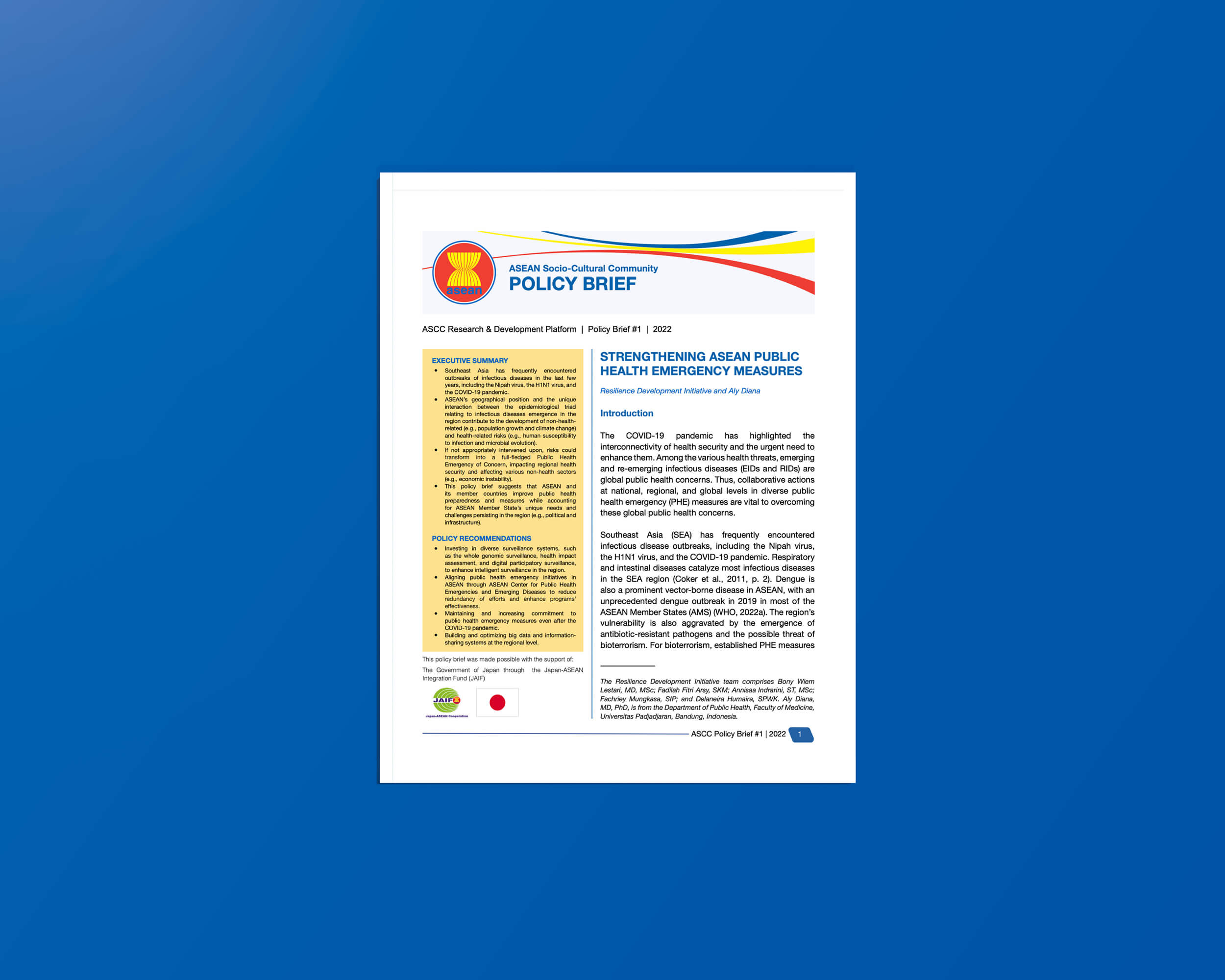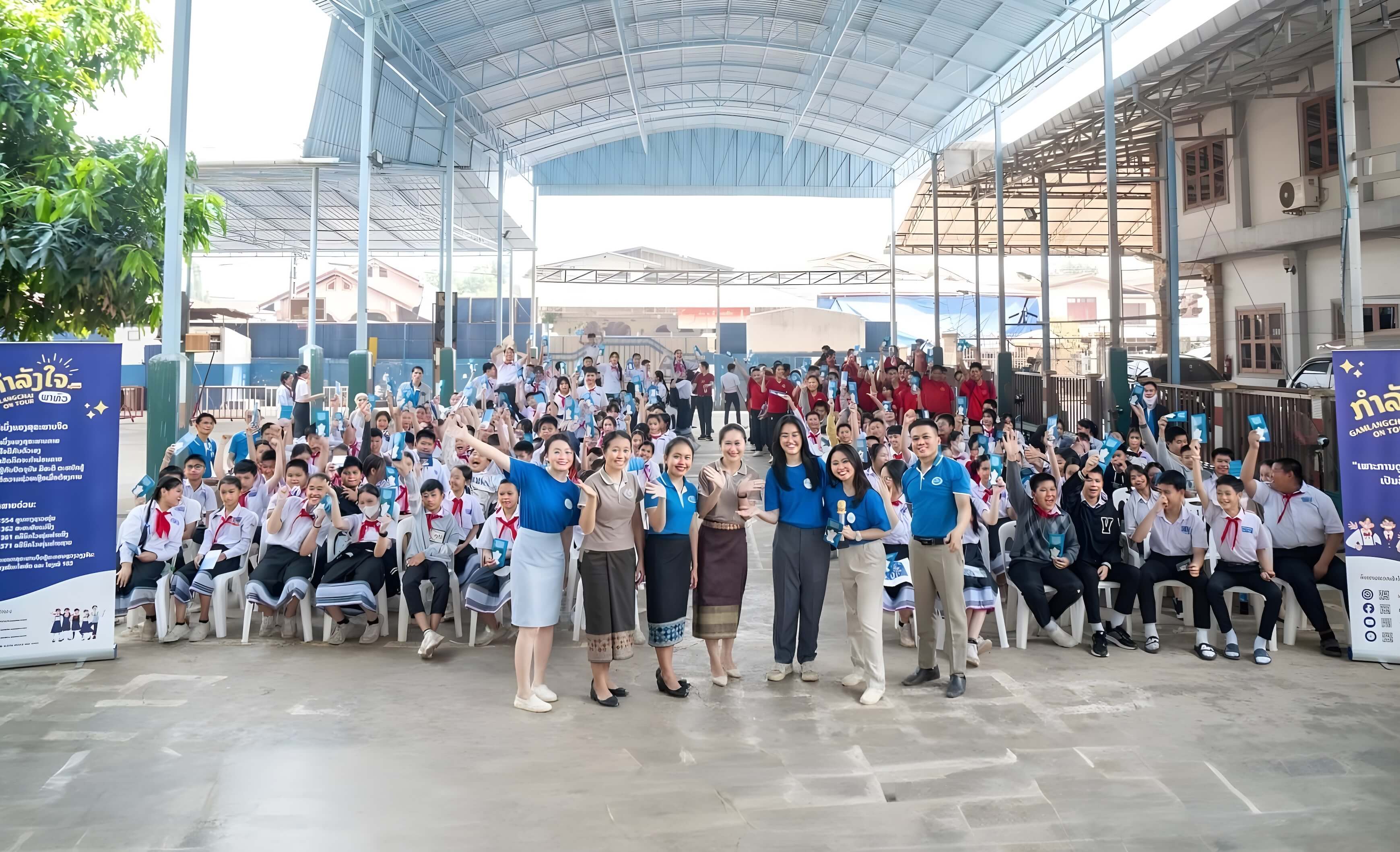




This policy brief discusses the challenges in strengthening ASEAN’s public health emergency measures. It highlights the need to invest in diverse surveillance and preparedness systems; align efforts to efficiently use available resources; strengthen capacities of infrastructure—such as vaccine manufacturers and laboratories—and of health workers through training and scholarships and improved healthcare and social protection; and enhance digital transformation in health.
The unique interaction among infectious agents and hosts in the environment, coupled with ASEAN’s geographical position, affect the development of both health risks and non-health related risks in the region. Health risks such as, microbial adaptation, human susceptibility to infections and health behaviours, along with non-health risks like rapid urbanisation and increased human mobility, can lead to the emergence and re-emergence of infectious diseases. As proven by the COVID-19 pandemic and previous outbreaks, these diseases pose regional and global health threats with far-reaching non-health impacts such as economic instability.
The pandemic has brought to light the vulnerabilities in our regional and global health security. While infectious disease outbreaks are not new to the ASEAN region—the Nipah virus, and the H1N1 virus, dengue and other respiratory and intestinal diseases have been encountered in the region, the COVID-19 pandemic has prompted the need for innovative and advanced ways to detect, mitigate and respond to health risks, especially those that may pose threats globally.
In the ASCC Policy Brief No. 1 (2023), “Strengthening ASEAN Public Health Emergency Measures,“ experts argue that implementing strategic actions tailored to address various risks in ASEAN’s health security is paramount.
The policy brief highlights that the pandemic has exposed the limited capacities of the existing health infrastructure to prevent, detect, and respond to health emergencies.
Surveillance systems which are crucial to detect the evolution of diseases, monitor trends and evaluate the impacts, tend to be diverse and fragmented. Early warning systems , risk assessment and communication, and information sharing, are crucial to ensure preparedness for public health emergencies (PHEs), but these are managed and operationalised by relevant national agencies of each ASEAN Member State.
Member States have no self-reliance on vaccines, therapeutics and diagnostics and this has greatly diminished their capacity to respond swiftly to PHEs. Limitations on manufacturers and resources, and disparities in laboratory and health worker capacities have also contributed to the overburdening of the region’s health systems.
The policy brief also highlights that the provision of health insurance and the implementation of different social protection programmes have aided in reducing the burden of PHE among vulnerable populations, and that a lack of safety nets can contribute to the breakdown of health systems. The brief further mentions that financing is a major hurdle to the implementation of universal health care and the provision of various social protection schemes.
Finally, the brief emphasises the role of digital transformation in health. Digital advancements can aid in the improvement of health systems. For example, the ASEAN BioDiaspora Virtual Center (ABVC) aims to improve the region’s capacity to respond to hazards and emerging threats via Big Data predictive analytics and visualisation.

In developing appropriate responses to public health emergencies, the brief flags political, financial, infrastructure-related, behavioural and food-security-related challenges that need to be addressed. The policy brief lays down the following recommendations:
i. Intelligent Surveillance
An advanced and integrated regional surveillance system that can combine multiple types of surveillance to predict future threat development is needed. While there has been increasing data sharing among the ASEAN Member States, surveillance systems in general tend to be diverse and fragmented. Approaches or tools such as the Whole Genomic Surveillance (WGS) and Health Impact Assessment (HIA) for climate change are some of the surveillance systems that can supplement regional systems.
ii. Aligning ASEAN’s Initiatives and Programmes
There is a need to harmonise efforts at the regional level to ensure a unified and streamlined response in times of PHEs. Therefore, it is important to identify existing regional initiatives such as the ASEAN Emergency Operations Center (EOC) and the ASEAN BioDiaspora, and for a regional body or institution to be able to list, align, and coordinate the regional and national initiatives relating to health emergencies to ensure better-targeted response and use of resources and to avoid redundancy of efforts. The brief highlighted that the ASEAN Centre for Public Health Emergencies and Emerging Diseases may be well-placed to fulfil this role.
iii. Maintaining and increasing commitment to PHE measures even after the COVID-19 Pandemic
The commitment to long-term PHE measures is essential, and can be done through enhancing self-reliance on vaccines, therapeutics and diagnostic tools; increasing laboratory capacity and strengthening health workers’ ability to manage infrastructure through capacity building and training on PHE management; and, developing social protection measures and programmes through expanding community-based health insurance and social assistance through primary healthcare facilities.
iv. Building and optimising big data and information-sharing system
To optimise the benefits of digital transformation and big data analytics, there is a need to advance data-sharing systems. Diverse protocols in data gathering, limited infrastructure to conduct AI analysis at the regional level and gaps in the Member States’ capacities can hinder the potential advantages of digital transformation. The brief recommends conducting feasibility studies and landscape analyses to assess the possibility of big data network development at the regional level, and to develop guidelines that will ensure standardisation in data gathering and encoding, and to enhance greater regional cybersecurity measures.
Download the policy brief from:
https://asean.org/wp-content/uploads/2023/05/ ASCC_Policy-Brief_ Issue-7_Jan2023.pdf








